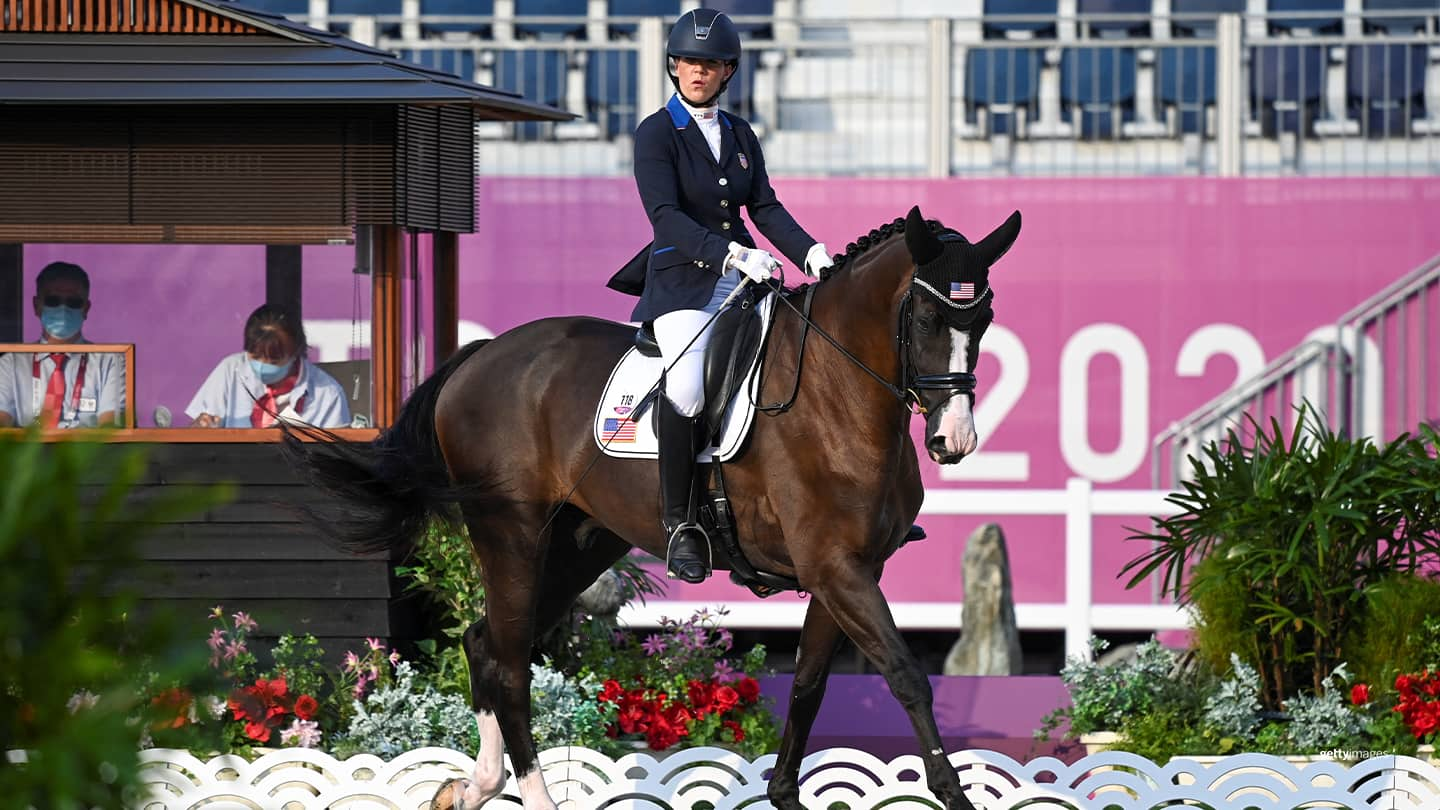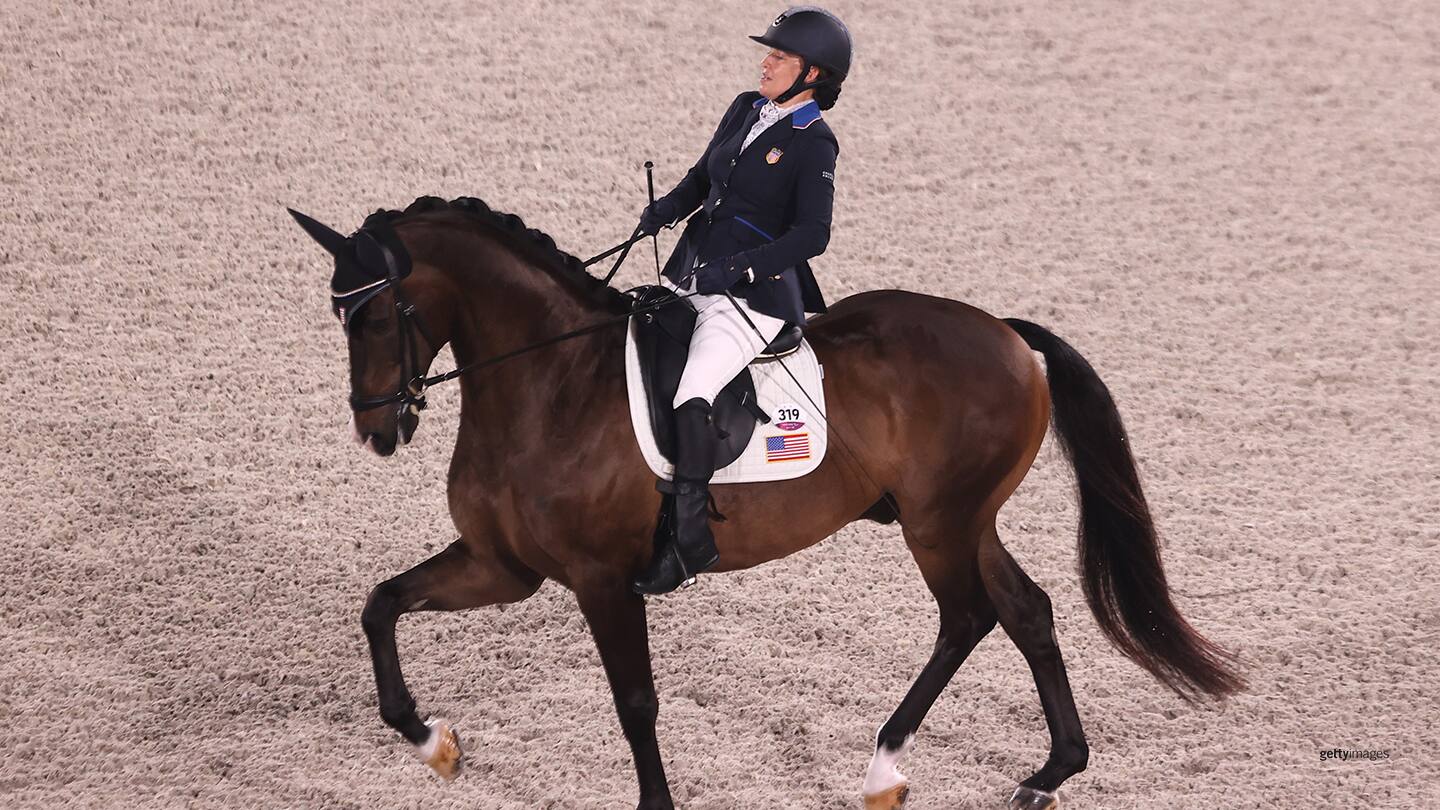
Perfect Partners: Roxanne Trunnell And Dolton Made U.S. Equestrian History In Tokyo
by Marc Lancaster

Roxanne Trunnell and horse Dolton compete in the dressage individual test - Grade I at the Paralympic Games Tokyo 2020 on Aug. 27, 2021 in Tokyo.
For Roxanne Trunnell, the path to what would become a historic Paralympic Games Tokyo 2020 performance came into focus three years ago.
In September 2018, she teamed with a new partner, Dolton, for the World Equestrian Games in Tryon, North Carolina, and the pair came away with a bronze medal in the Grade I dressage individual freestyle test. Trunnell had never finished higher than seventh at a major international competition before, but it was clear she and Dolton had something special, and their partnership was sealed when Karin Flint bought the gelding after the Tryon performance.
“Not only did I win my first medal at that WEG but I also won the opportunity to continue riding this fantastic horse,” Trunnell told TeamUSA.org.
The duo have been all but unstoppable ever since, culminating in a dominant showing in Tokyo that saw them take gold in the Grade I individual test and individual freestyle tests and help the United States to bronze in the team test to music. It was the first team dressage medal for the U.S. in the Paralympics, and Trunnell was the first American to win Paralympic gold in equestrian since 1996.
Those three trips to the podium marked quite a departure from Trunnell’s experience at the Rio Games, where she finished 10th in the individual championship and the U.S. placed 14th in the team dressage. She rode Royal Dancer in Rio but did not have the bond with him that she has developed with Dolton, and she believes that made all the difference in Tokyo.
“I am the only one who competes Dolton, and I get to ride him four to five times a week,” Trunnell said. “I spend a lot of time just hanging out with him at his stall, it is very clear that he loves me and trusts me. When we go into a ring he knows I won’t put him in a bad position and I know he is going to try his hardest for me. He’s got my back and I’ve got his.
“Having done a Paralympic Games before did make me calm since I knew what to expect, but mostly what made me calm was going into it riding Dolton. I knew we both have done these tests together a lot and that we were just going to go out and do our thing in the arena like we’ve done at all the shows before this one.”
The 36-year-old from Richland, Washington, entered Tokyo as the top-ranked dressage athlete in the world and a favorite to win gold but noted “anything can happen” in the show ring, so she kept her focus on trying her best.
Everything came together as planned, with Trunnell recording a score of 81.464 percent to win the individual test over Latvia’s Rihards Snikus and Italy’s Sara Morganti. She followed that up with a competition-best 80.321 in the team competition as she joined Rebecca Hart and Kate Shoemaker on the podium along with teams from Great Britain (gold) and the Netherlands (silver). Trunnell closed out her run in Tokyo with a Paralympic record score of 86.927 in the individual freestyle test to beat Snikus and Morganti once again.

Rebecca Hart and horse El Corona Texel compete in the dressage individual test - Grade III at the Paralympic Games Tokyo 2020 at on Aug. 27, 2021 in Tokyo.
I just had a sense of calm to me,” Trunnell said. “I had a great horse, good coaches, and I knew my tests by heart so I was just thinking everything would be fine.”
She developed that mindset over years in the ring, competing as an able-bodied athlete before she contracted the H1N1 virus in 2009. Complications led to a stroke and a diagnosis of cerebellar ataxia — a loss of muscle control or coordination — which resulted in her requiring the use of a wheelchair.
Trunnell initially resisted Para dressage and wanted to continue competing in able-bodied events but eventually developed an appreciation for the attention to detail required to succeed in her new realm.
“One of the reasons I fell in love with dressage is how difficult it is, and that there is always room to grow,” she said. “By just doing your tests at a walk, you and your horse are under strict microscopic judgment from the judges. You can’t hide any little bobble from the judges — they see everything.
“If you fuss with your horse’s mouth too much you risk them going into a lateral or short walk. In the PSG (Prix St. Georges) tests if something isn’t feeling right in the trot for example you can move into the canter work and sometimes just pushing the horse forward more would fix the issue. Not being able to do this during the Grade I tests adds to the degree of difficulty, making the tests actually more difficult than the able-bodied upper-level tests.”
Trunnell’s growing mastery of those nuances has put her at the top of her sport, but she is far from finished. She plans to “keep competing and winning more medals” with Dolton and is already looking forward to the national championships at Tryon in late October, the world championships in Denmark next August and, of course, Paris 2024.
Whatever happens going forward, she can compete knowing she already has achieved a lifelong goal by winning gold in Tokyo — even if her vision of what that would look like has evolved over the years.
“I always envisioned that gold-medal moment on the podium as an able-bodied rider, so it did feel a little different having this moment as a Para rider sitting in a scooter,” she said. “But even after all this happened to me, I still came back and achieved my goal of representing my country and getting a gold medal. That is pretty cool and should show para riders and even able-bodied riders that anything can be achieved if you are willing to put in the work for it.”
Marc Lancaster is a writer and editor based in Charlotte. He is a freelance contributor to TeamUSA.org on behalf of Red Line Editorial, Inc.